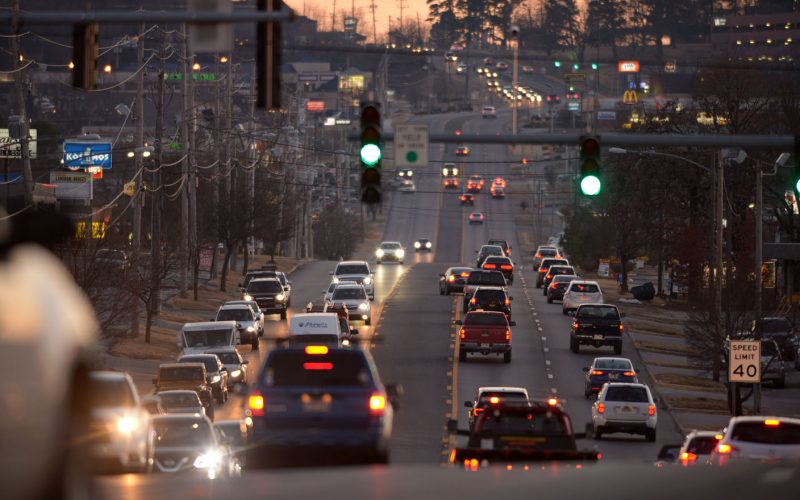Planners consider evolution of College Avenue
STACY RYBURN
sryburn@nwadg.com
College Avenue transformed over decades from a two-lane dirt road cutting through trees and farmland to a main thoroughfare nearly impossible to avoid in the course of daily life. It will change again.
City planners want to make sure the corridor evolves in the right way.
The City Council in December rezoned College Avenue from Maple to North streets and applied downtown design standards to the buildings in that area. The regulations will make it so any new buildings will sit 10 to 25 feet from the sidewalk and reach a height of no more than four stories. Drive-throughs would have to gain Planning Commission approval.
The stretch has undergone some aesthetic improvements, such as the addition of 10-foot-wide sidewalks, LED lighting and decorative trees. A mural, still in development, will cover an old retaining wall that crews couldn’t remove for safety reasons.
City planners want to extend that improved sense of place from North Street to the northern city limit.
A request for proposals went out this month seeking a contractor who will oversee a College Avenue corridor planning process. The consultant will organize public input meetings, come up with concept designs and present a rezoning plan, Development Services Director Garner Stoll said.
“This corridor pretty much is in the center of things,” he said. “It defines Fayetteville, and historically it connects us all the way to Bentonville. It’s our past, and it’s our future.”
The administration initially set aside $100,000 to hire a consultant to update the city’s 2030 plan. Planning staff will handle that task instead, and the money will go toward detailed help with College Avenue, said Andrew Garner, city planning director.

The Free Weekly/ANDY SHUPE
Traffic makes its way Thursday past Evelyn Hills Shopping Center along College Avenue in Fayetteville. Fayetteville plans to hire a consultant to assist with a redevelopment of College Avenue corridor from North Street north to the city limit.
The consultant will have to consolidate other plans, including an updated mobility study and land use map, into one comprehensive College Avenue plan. That, and juggle the interests of residents, developers, business owners and city officials.
Planners went for a downtown, Main Street-esque feel to the stretch from Maple to North streets. That approach may work in some areas of the rest of College, but segments differ along the corridor, Garner said. The consultant will assess what’s feasible. For example, power lines likely will have to be buried, and an assessment will find any challenges on the front end, he said.
College Avenue through Fayetteville is U.S. 71 Business, part of the state highway system. Doing anything to the road itself, such as adding a bus lane, reducing the speed limit or restriping would require a permit from the Arkansas Department of Transportation, spokesman Danny Straessle said. Department officials have asked to be included in discussions with the consultant and city staff.
Fayetteville could take that stretch of U.S. 71B off the state highway system and maintain it as a city street. Rogers and Bentonville did that in 2016, taking over portions of Walnut Street and Walton Boulevard, respectively. In that instance, a city can do whatever it wants to the road, Straessle said.
For instance, city officials in the past have talked about a regional bus system or light rail.
“I mean it’s a great north-south corridor,” Straessle said. “The opportunities are endless. It’s who has the money and who wants to do what.”
A number of buildings have been up for sale or are changing hands, including the AQ Chicken building, an old music venue and a former Arvest bank. At least 20 businesses have put up new buildings in the past decade.
City planners want to take a long-term approach in guiding development when new ownership comes through, Garner said.
“If you don’t start with a visioning process or brainstorming to give you a strategy, it’ll just kind of be left to happenstance on how things turn over,” he said. “Right now, it’s not what anybody really wants as a citizen, I think.”
Critics of College Avenue list gas stations, strip clubs, sex shops and used car lots among its detriments. That doesn’t offend Sheldon Vinson, who gets a daily view of the road from Parker Motor Company’s panel-length windows.
Vinson said he wouldn’t want used car lots lining the corridor entirely, either. He welcomed improvements such as wider sidewalks and better lighting but wondered if such measures might raise the cost of doing business, driving redevelopment to other parts of town.
“You’re putting some new stuff mixed in with a bunch of old stuff,” Vinson said. “Until you get rid of all the old stuff, it’s like putting glitter on a pig — it’s just not going to work.”
Concern over the future of College Avenue is nothing new. When the Goff-McNair showroom opened north of Dickson Street in 1948, residents predicted the end of College Avenue as they knew it, according to Tony Wappel and Dennis Garrison’s book “On the Avenue: An Illustrated History of Fayetteville’s U.S. Highway 71B.”
They weren’t wrong. Over time, businesses started replacing homes along the arterial. State crews widened the road from two to five lanes beginning in the 1970s. What once was farmland became the city’s busiest intersection at Joyce Boulevard.
Michael and Betsy Pugh opened Weathered Goods Handcrafted Furniture at 1904 N. College Ave. about a year ago. The couple welcomed the idea of bringing a Main Street vibe to the highway.
The two are living examples of the potential for mixed-use development. They live in a 1920s-era house right behind the shop.
The concept could work for the rest of corridor as well, they said.
“We bought this property, and we’re invested in this space,” Michael Pugh said.
City staff anticipate working on the plan with the consultant for the majority of the year. The Planning Commission and City Council will approve the final proposal.
FYI
College Avenue Corridor
The city will hire a consultant to develop a corridor plan for College Avenue with an emphasis on redevelopment, complementary land uses, urban design and capital infrastructure investments. The primary objectives are:
• Implement the goals of the city’s land use plan.
• Lead a public education and participation effort around the issues and potential solutions in the corridor area.
• Provide a vision for the corridor.
• Recommend land use regulations and infrastructure improvements.
• Culminate the efforts in adopting a plan for the corridor.
Source: Fayetteville






